Alan Paul's Blog, page 20
August 16, 2016
Les Brers announces new dates – Sept. and Oct. East Coast dates
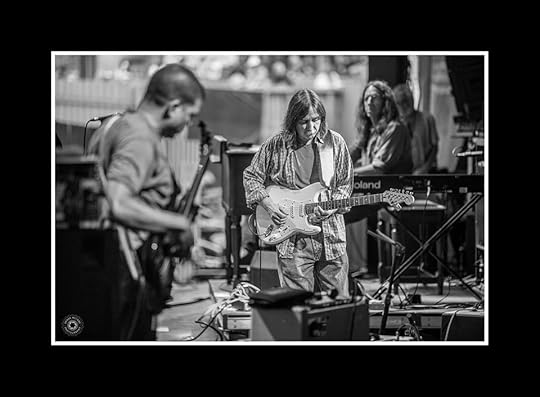
Peach Fest photo by Derek McCabe
Great news that Les Brers has added a bunch of tour dates and will perform two East Coast swings, one in September and one in October. The dates are below. For more details and ticket-buying links, visit the band’s website here.
Les Brers features five former members of the Allman Brothers Band – Butch Trucks, Jaimoe, Marc Quinones, Oteil Burbridge and Jack Pearson – plus Bruce Katz, Pat Bergeson and singer Lamar Williams Jr.
07 SEP THE RIDGEFIELD PLAYHOUSE RIDGEFIELD, CT
08 SEP CASINO BALLROOM HAMPTON BEACH, NH
09 SEP HOUSE OF BLUES, BOSTON, MA
10 SEP PARAMOUNT THEATRE, RUTLAND, VT
12 OCT BROOKLYN BOWL BROOKLYN BOWL, BROOKLYN, NY
13 OCT WELLMONT THEATRE WELLMONT THEATRE, MONTCLAIR, NJ
14 OCT FILLMORE PHILADELPHIA
15 OCT CHAMELEON CLUB, LANCASTER, PA
16 OCT NYCB THEATRE AT WESTBURY, WESTBURY, NY
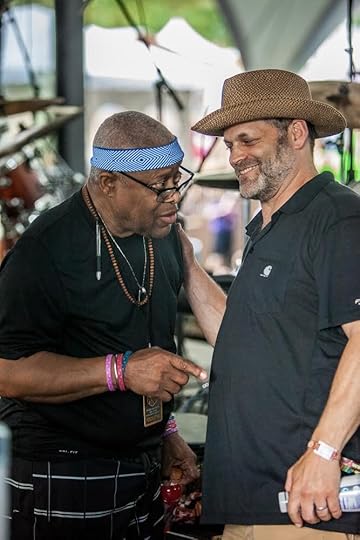
Always a pleasure to see Jaimoe. Peach Fest photo by Derek McCabe
Click through to see a collection of Derek McCabe photos of Les Brers from PeachFest 2016







August 8, 2016
Chinese Massage Can be Elicit and it Can be Painful
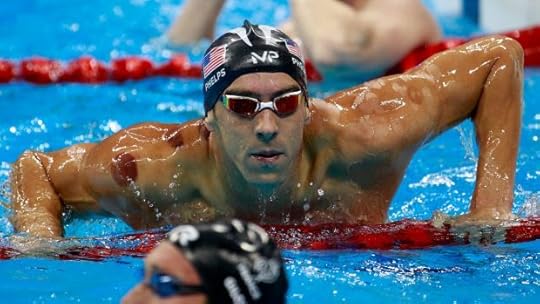 With Chinese cupping in the news thanks to the strange circular black and blue marks on Michael Phelps and other US swimmers, I thought I’d share my own experience with the procedure. My The Expat Life column from WSJ.com from almost a decade ago:
With Chinese cupping in the news thanks to the strange circular black and blue marks on Michael Phelps and other US swimmers, I thought I’d share my own experience with the procedure. My The Expat Life column from WSJ.com from almost a decade ago:
Massage in China is plentiful and fairly cheap — anywhere from $10 to $20 for a 60- to 90-minute, Western-style oil massage. It costs less for a traditional Chinese massage, where you keep all your clothes on, have a sheet placed over you and get manipulated in ways that aren’t necessarily relaxing but can be quite beneficial. Foot massages are popular as well, especially among women.
There are also many massage joints that are actually fronts for brothels, but luckily they are generally easy to pick out. One solid clue is an attractive young woman in a white leather miniskirt running out of a storefront, grabbing you by the arm and saying, “You need very relax massage!” I have actually had to pry their hands off, while firmly saying, “bu yao” (don’t want) and moving on.
I have a persistent ache in my left shoulder. It’s usually dull and only mildly bothersome, but every once in a while it flares up badly and seems to lock me up from my neck to my elbow. One such day a while back, I was sitting in a Starbucks pecking on my laptop, increasingly distracted by the tightening on my left side. Realizing I wasn’t going to get much work done, I decided to try to work the kink out at the traditional Chinese massage place down the block, which I knew to be both legit and first-rate. On my sole previous visit, the masseuse immediately found my sore spot, put her finger on it and said, “Pain.”
I was pleased when the same woman appeared. I said I wanted an oil massage, focused almost exclusively on my left shoulder. I used my usual blend of Chinese and charades and hoped that she understood. Lying face down on the massage table, I felt pleased with my communication skills as she dug into my left upper back, hitting the right spot and staying there for a good long time.
I could feel the knot opening up and dissipating when she suddenly stopped and poured extra oil on my shoulder. I then felt her put a hard and warm object on my back, and imagined she was using a device to exert extra pressure. Then she started moving the thing up and down the scapula. It felt great at first, but as she continued to move, the oil seemed to dry up and the pressure intensified to the point of pain and then beyond.
I yelped and craned my head backward, trying to see what was going on. She said something I didn’t understand and turned toward a table behind her. I still felt an intense pinching and pulling on my left shoulder as she turned back to me holding a glass jar in her hands, leaning over to place it on the right side. I yelped and groaned but she just shoved my head back down, saying something that I took to be, “It will be good.”
After having slid the jar along my left shoulder blade for quite a while, with increasing pain, she removed it, then put it back down about half way up the shoulder. I now had jars on each side, which remained in place while the masseuse worked my lower back. It hurt. A lot. Imagine two high-suction vacuum cleaners clamped onto your back. I just lay there and groaned. I’m still not sure if my silent submission means I am a very strong man or a very weak one.
When my hour was up, she removed all the jars and washed my back with hot towels. I was dazed and stiff, and unable to determine how my normal shoulder ache felt — it was replaced by a whole-back soreness.
That night, I related this tale to my wife and asked if I had any marks on my back. I pulled my shirt up and she screamed. I ran into the bathroom, craned my head toward the mirror behind me and took in a rather grotesque sight — my entire left shoulder was black and blue, while the right side bore a perfect black and blue circle.
“What did they do to you?” Rebecca asked with alarm.
“I’m not really sure,” I meekly confessed. “Something with heated jars.”
The next day I showed a friend my back and learned that I had “been cupped.” Googling “massage cupping,” I stumbled onto a wealth of information, largely written in a New Age patois that I found impossible to penetrate. Seeking enlightenment, I called Dr. Barry Disch, a Traditional Chinese Medicine doctor at Beijing’s United Family Hospital, who was one of the first Westerners accredited to practice acupuncture in Beijing.
“Cupping is very popular here,” said Dr. Disch. “I am not a big believer, because I think you can use acupuncture and some massage techniques and get the same results without ugly octopus-like bruises. But I don’t think it does any harm and some people really believe it.”
Okay, but what exactly is actually happening? And what is supposed to happen? I looked on www.massagecupping.com and it said something about “draining fluids and toxins” and “lifting connective tissues,” but it sounded like mumbo jumbo.
“Basically, they are using suction to take the evil chi out of your surface channels,” Dr. Disch said. “In scientific terms, it’s hard to say what is happening. You are breaking some vessels and creating circulation and bruising and that may have some anti-inflammatory effects.”
So the bruise is supposed to be a good thing?
“Basically, yes. It’s a very common belief in Chinese medicine that bruising proves that you had some kind of pathogen there.”
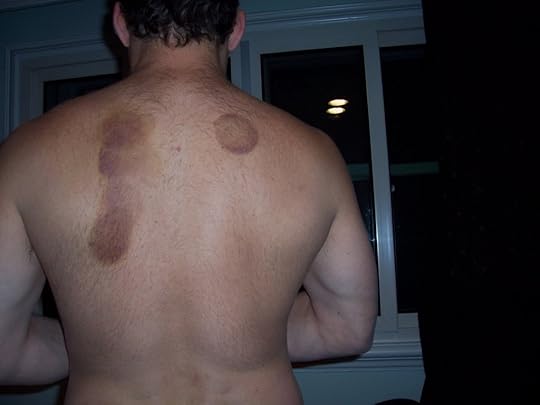
This was days later and already faded.
To me, that sounded dangerously like the old practice of determining whether or not someone was a witch by pushing them underwater — if they drowned their name was cleared but their life was lost. I didn’t really need to have my shoulder beaten to a pulp to know there was something wrong with it.
For about two days, I felt like someone had beaten my back with a baseball bat. When that pain receded, I suddenly realized that the shoulder was largely ache-free. It was a strange and welcome sensation, but I hesitated to credit the cupping because I thought perhaps I was merely relieved to have the bruising pain recede. Within a day or two, everything was back to normal, a mild ache returning to its rightful perch in my left shoulder.
I have considered going back for another session, but can’t quite bring myself to do it. As shocking as it was to be cupped out of the blue, I find it impossible to walk in fully aware of what’s to come. At least I don’t have to fend off any cuppers on the street.
August 1, 2016
Happy Birthday Jerry . New Garcia/Saunders soundboards!
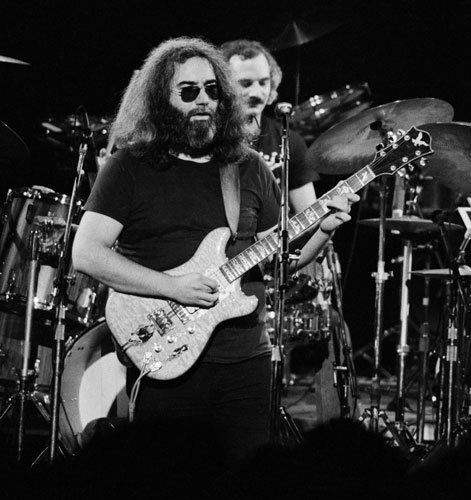
Photo – Jay Blakesberg. Jerry and Wolf, GD, Capitol Theater, Passaic, NJ, November 24, 1978
What better way to celebrate what would have been Jerry Garcia’s 74th birthday with some newly discovered soundboard recordings courtesy of our friends at Jambase.
Scott Bernstein writes, “Nearly a dozen rare recordings from Garcia’s time in the Grateful Dead as well as performances with keyboardist Merl Saunders have been shared via Bit Torrent site bt.etree.org this morning. The four Garcia/Saunders soundboards are especially nice treats.
Up first is a Garcia/Saunders recording from the Capitol Theatre in Passaic on September 6, 1973 which is thought to be the first time a soundboard of the show has circulated. Jerry and Merl are backed by Bill Kreutzmann and John Kahn on “Expressway (To Your Heart),” “The Night They Drove Old Dixie Down,” “I Second That Emotion” and more. Next up is a soundboard recording of Garcia/Saunders visit to Keystone in Berkeley on October 11, 1973. On this night, Garcia and Saunders were aided by Kahn and drummer Bill Vitt. The big surprise in this one is the first and only know Merl/Jerry cover of Stevie Wonder’s “Sunshine Of My Life.” Jerry, Merl, John and Bill jam on the tune for over 15 minutes.”
July 28, 2016
Watkins Glen Story and Video
 In 1973, the Grateful Dead, Allman Brothers Band and The Band teamed up for the Watkins Glen Summer Jam in New York’s Finger Lakes Region. It was the largest music festival ever, drawing about 650,000 people — nearly twice as many as Woodstock four years earlier.
In 1973, the Grateful Dead, Allman Brothers Band and The Band teamed up for the Watkins Glen Summer Jam in New York’s Finger Lakes Region. It was the largest music festival ever, drawing about 650,000 people — nearly twice as many as Woodstock four years earlier.
The one-day festival was planned by the Dead’s Sam Cutler and the Allman Brothers Band’s Bunky Odom. They agreed together to invite The Band to open the day’s music.
“We thought those three bands represented America,” says Odom. “They were the three best American bands and they related to each other, the music related, the fans related and they all knew each other. It was just a great fit.”
The concert was planned for the Grand Prix speedway in the remote hamlet of Watkins Glen, New York. The concert was produced by two young promoters Jim Koplik and Shelley Finkel, who paid the Dead and Allman Brothers $110,000 each. One hundred and fifty thousand tickets were sold for $10, but the crowd exploded to many times that number. The rest got in for free, though many of the masses certainly never got within sight of the stage. The small country roads leading to the concert site became parking lots – first figuratively, then literally, as many people abandoned their vehicles and walked miles to the concert.
“It was hard to get in and out of that place,” says Weir. “It got way, way bigger than we intended for it to get. We thought maybe if we’re lucky we’d get 100,000 people; 60-70,000 would be nice and handle-able.”
With crowds pouring in and an estimated 200,000 people already on site, the July 27 soundchecks became public performances. The Dead played about two hours, followed by The Band playing for close to an hour, then the Allman Brothers, reportedly feeling pressured to match the Dead, performed a two-hour set. The one-day festival had organically doubled in length.
Recalling the soundcheck still registers amazement in the voice of Allman Brothers drummer Butch Trucks. “That afternoon rehearsal ended up being my most powerful memory because in daylight you could see 600,000 people stretched out in front of you and my God! What a sight!” he says. “Everyone should get up in front of 600,00 people some time in their life. It’s sort of intimidating but also very, very inspiring.”
At Cutler’s insistence, the promoters had hired Bill Graham, a key figure to both the Dead and Allman Brothers, to handle the staging and backstage area. Graham had taken his usual care in constructing a welcoming backstage area, which Perkins recalls as “idyllic.” Palm trees were brought in and most band members had their own trailers, traipsing in and out of one another’s spaces, with endlessly mutating jam and hangout sessions. Leavell, Kreutzmann, Garcia and Jaimoe seemed to particularly enjoy playing with one another. In his memoir, Deal , Kreutzmann writes that his best memories of the Summer Jam was playing with Jaimoe backstage.
, Kreutzmann writes that his best memories of the Summer Jam was playing with Jaimoe backstage.
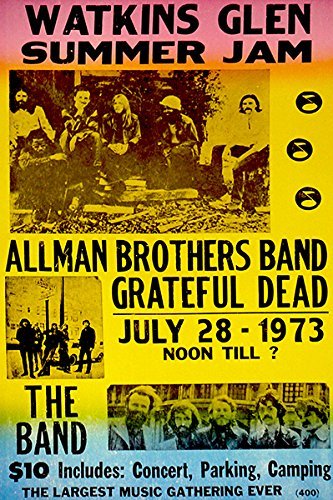 While the bands were enjoying each other’s company, the crowd just kept swelling. Impossibly hot weather was interrupted by rain storms, but things remained mostly calm and friendly. In A Long Strange Trip: The Inside History of the Grateful Dead
While the bands were enjoying each other’s company, the crowd just kept swelling. Impossibly hot weather was interrupted by rain storms, but things remained mostly calm and friendly. In A Long Strange Trip: The Inside History of the Grateful Dead , Dennis McNally reported that the county sheriff said, “We have four or five times as many people here as we have at our races, and we are getting less than half the trouble. These kids are great.”
, Dennis McNally reported that the county sheriff said, “We have four or five times as many people here as we have at our races, and we are getting less than half the trouble. These kids are great.”
“The news reported there were 600,000 there and maybe 2 million people in the area and it was declared a disaster area,” recalls Weir. “As disaster areas go, it was a pretty nice one, but people who were interested in going home, for instance, well, they couldn’t. If they wanted to leave, it just wasn’t possible. People had to be peeled away by layer by layer.”
This story is excerpted from a much longer piece which will appear in an upcoming Grateful Dead magazine I wrote and edited. Stay tuned for more info.
Video of the event, shot on Super 8, has recently surfaced. Enjoy. It’s quite a gem.
July 25, 2016
Gregg Allman joins Tedeschi Trucks for One Way Out
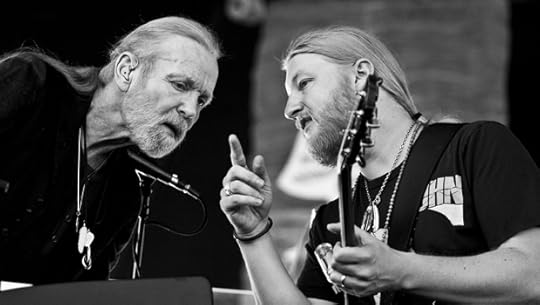
Photo by Jason Riedmiller – Peach Festival, 2014
Gregg joined the Tedeschi Trucks Band on stage at the Uptown Amphitheatre, Charlotte, NC last night (July 24). Now, this is interesting, because Derek has really kept his distance from the ABB since it ended in 2014. Also happy to see my man Luther Dickinson out there.
Yeah, Gregg messed up the vocal entrance, but whatever… he sounded good and the fact that this happened is very cool.
July 20, 2016
Jerry Garcia – “After Midnight” 11-8-76 Newly Released
A great version of a song I love, newly unearthed:
Rare 1976 Jerry Garcia Band track
“After Midnight”
from GarciaLive Vol. 7:
November 8, 1976
Sophie’s Palo Alto
Featuring Donna Jean Godcheaux
This release is due out in August. Visit www.jerrygarcia.com for more info.
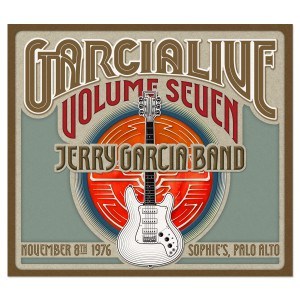
July 19, 2016
Buddy Guy Interview
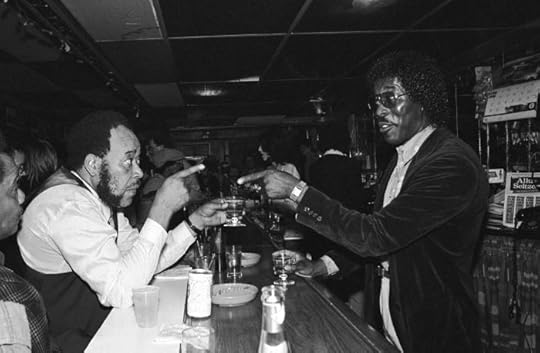
5/3/1983– James Cotton and Buddy Guy at the Checkerboard Lounge for Muddy Waters’ funeral wake – © Kirk West.
I did this interview and wrote the extended intro for Guitar World in 2001. Buddy Guy has a special place in my heart for the reasons described below.
Buddy Guy was the first musician I ever interviewed, 15 years ago, for The Michigan Daily, my college newspaper. He mesmerized me with his tales, stories of growing up in Louisiana, moving to Chicago, struggling to develop his own voice on the guitar, and the crucial tutelage of blues icons like Muddy Waters, Sonny Boy Williamson and Howlin’ Wolf. He described his hesitancy to give up his day job working as a car mechanic to go on the road as a solo act. And he bemoaned his then-current career straits, which found him label-less and robbed of The Checkerboard, his Southside Chicago blues club, by unscrupulous partners.
The next night I saw him playing at Rick’s American Cafe, a cramped campus watering hole where I worked, and was completely hooked. His powerful charisma, demonic intensity and edgy psychedelic blues playing made me a true believer. I understood why the likes of Jimi Hendrix, Eric Clapton and Jeff Beck had for so long sung his praises and was baffled about why his career seemed so stalled.
Lo these many years later, when I talk to Guy again on the eve of the release of Sweet Tea (Jive Records), many things have changed. He’s still the blues’ most edgy, go-for-broke player, but his celebrity fans are no longer singing his praises in the dark. Ten years after making his long-delayed splash with the star-studded album Damn Right, I’ve Got the Blues, Guy is a well-established entity, trailing only the omnipresent B.B. King in terms of blues franchise names. His downtown Chicago club Buddy Guy’s Legends is a Windy City fixture, and he now plays sold-out theaters and festivals rather than small bars.
But over the years, his albums moved away from the tightly coiled intensity that have always made him such a dynamic figure on stage, becoming more stylized and less unpredictable. Until now. Sweet Tea, his fourth studio album for Silvetone since his Damn Right breakthrough is a radical deaprture from its predecessor. Recordied in the Mississippi studio of producer Dennis Aherring (Counting Crows), the album finds Guy exploring the droning, modal sensibilities of Mississippi hill country music, covering tunes by the likes of T Model Ford and the late Junior Kimbrough.
From the raw, sparse solo acoustic opening tack, “I Done Got Old” to the thumping, fuzzed out bass and droning guitar of “Baby Please Don’t Leave Me,” the album is raw, spooky and dark. It’s also his finest effort in many years. With no special guests and little studio ornamentation, the focus is solely on Guy’s intensity and he tense dynamics which infuses both his singing and playing. Exactly the things which have been elctrifying everyone who’s crossed his path for the last 30 years or so.
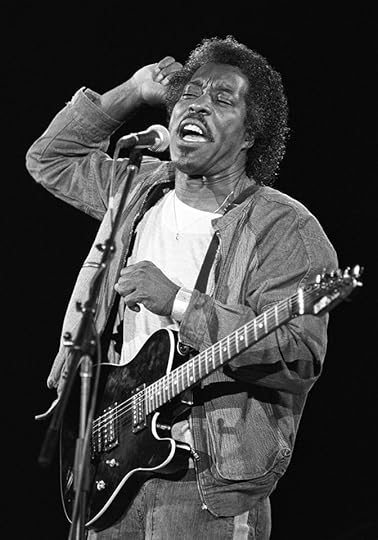
This is the Buddy I first encountered. Foto – Kirk West
*
Buddy Guy didn’t exactly jump for joy when someone at his record label suggested he record a raw album.
“I went, ‘What the fuck is raw?,’” Guy recalls, with unusual candor. “But I was denied a record contract for 15 years so I’m not going to be too picky about what I do. I don’t have the juice to say no too many times.”
So the Chicago bluesman packed his bags and headed South to Oxford, Mississippi. Producer Dennis Herring (Counting Crows) was waiting with a hand-picked band of bassist Davey Farragher (Cracker, John Hiatt), guitarist Jimbo Malthus (the Squirrel Nut Zippers) and a rotating cast of veteran drummers, including Pete Thomas (Elvis Costello, Los Lobos) and Mississippi bluesmen Spam and Sam Carr. The quartet set up in one big room and played live for five or six hours a day for 10 days straight, seeking to capture the excitement of Guy’s live performances, which have made true believers out of Eric Clapton, Jimi Hendrix and countless others over the last 40 years.
“I’ve always been a huge Buddy Guy fan, though I thought in recent years his records had gotten very ‘studio-like,’” says Herring. “I wanted him to record in an older, more real setting that would capture the energy and intensity he still has.”
As part of that process, Herring introduced Guy to the droning, modal Mississippi hill country blues played by the likes of Junior Kimbrough, T Model Ford and R.L. Burnside, tunes which ended up dominating Sweet Tea’. From the sparse solo acoustic “Done Got Old” to the overdriven basslines and distorted guitar solos of “Stay All Night,” the album is a compendium of raw, spooky, dark sounds. With no special guests and little studio ornamentation, the focus on Sweet Tea is solely on Guy’s intensity and the tense dynamics that infuse both his singing and playing. The result is the guitarist’s best album since his ‘91 breakthrough Damn Right, I’ve Got the Blues and probably his most stripped down since the landmark A Man and the Blues, a masterpiece of controlled frenzy recorded way back in ‘67.
ALAN PAUL: Did you enjoy making this record the old fashioned way?
BUDDY GUY: Yes, I did, because I thought this old way of doing things couldn’t even be found any more. But I won’t lie to you: when I first got down there and looked around, I said, “What the hell is this?” Dennis don’t have all the high tech gadgets like everyone else does. He has all these great old amplifiers like you can’t find no more and this old board, so he can get the good, old sounds. And that gave me a lift. He plugged me into some amps that sounded so good I said, “I’ve been looking for this sound since 1957, when I could just plug a new Strat into a new Bassman and have all the sound I need.” That was perfect. That you can’t find that no more is an example of tech gone crazy. Why did they keep changing guitars and amplifiers when they were perfect? They did the same things with cars, if you ask me. They forgot how to make them right, because they focused on style and bells and whistles. So going back to plugging in to the real stuff and just playing was a lot of fun.
You recorded songs by Mississippi guys like Junior Kimbrough and T Model Ford. Were you familiar with their stuff?
No. Everyone thinks because you’re from the South, you know everyone down there, but it’s not like that. I never knew nothing about no Mississippi. I was from Louisiana and then I moved to Chicago. Everyone there was always referred to as being from the Delta, but it just wasn’t so and there’s a lot of differences. For instance, in Texas, you had Lightnin’ Hopkins and in Louisiana you had Lightnin’ Slim and in Mississippi, you had Muddy and Wolf and everyone who came to Chicago as well as guys like Fred McDowell and John Hurt, who stayed down there. I didn’t really know those guys, except meeting them a few times on festivals.
Anyhow, they played me some of this music by the Junior guy and some others and it was different. I took tapes back to the house I was staying in and listened to them early in the day, before we recorded. It’s in my bones to get up every morning at 4:30 or 5 because I’m a country boy, raised on a farm, so I would just listen to this stuff and try to find my spot. I can play with any kind of music because I play by ear and after a few days I started feeling it and getting into it. In a way, it reminded me of when I recorded with Muddy and Sonny Boy and everyone at Chess. They would call me up and I’d go to the studio, sometimes right out of bed, and just play without ever even having heard the song. The difference was, then I couldn’t believe I was playing with these legends and now the guys in the band treated me like that. I kept telling them that I was more nervous than they were.
The music has very limited chord changes. Is that challenging or easy to solo over?
It doesn’t matter, because I’m self taught and used to playing music how I feel it. That’s the one way old blues guys from anywhere are the same. [laughs] For instance, a lot of people say they can’t play with John Lee Hooker because there’s no pattern, but I have no problem playing with John. You can hear in his voice when he’s getting ready to make a change because he plays it the way he sings it and sings it the way he plays it. You get a groove and play off that and change when you damn well feel like it. People think blues is all about 12-bar patterns, but it’s not like that and never was.
The first time I interviewed you 15 years ago, you had no record deal, you had lost your club and you really felt like you were on the outside looking in. Now you have a major label deal, you play much bigger places and you even own the biggest blues club in Chicago. That must be satisfying.
I feel much better now than I did then, but no one is never satisfied and I’m no different. Besides, my music hasn’t reached the point where all the music based on it and based on and what the people I love’s music has reached, so I don’t see how I could be satisfied. You take a Buddy Guy or Muddy Waters record and it might be good but to be a hit, you have to give it to Bonnie Raitt or Eric Clapton or Mick Jagger and that don’t seem right. It worries me that they’re not going to play your record if you’re black and play the blues. To this day, I wonder what it’s going to take to change that. And so many guys are gone. B.B. and me are like the last Mohicans out here doing it every night.
But I wasn’t to make it clear that I don’t hold it against the other musicians. I wouldn’t even be here today if it weren’t for people like Eric and the Rolling Stones telling the world about us. I’m blessed to have people like them as friends. I got signed to this record deal after Eric put me on stage with him two nights in a row at the Royal Albert Hall in London. And it’s always been like that. When the Rolling Stones came here way back when they couldn’t believe that no one in America knew who Muddy Waters was. They loved him so much that they named themselves after one of his songs, but here in his homeland no one wanted to hear about no black man playing blues. Even Jimi Hendrix had to go London to get a damn record deal, same as me.
June 29, 2016
Les Brers and Freight Train Band both to tour

Les Brers Photo – Kirk West
I am very pleased that the two bands Butch Trucks has put together to play the music of the Allman Brothers Band will be out on the road this summer and early fall.
LES BRERS, which is as close as anyone sounds to vintage ABB and which has not performed much outside of Wanee and Peach Festivals, has announced a new string of fall concerts. The group features founding ABB drummers BUTCH and JAIMOE, longtime members OTEIL BURBRIDGE (bass) and MARC QUINONES (percussion), former ABB guitarist JACK PEARSON, frequent ABB guest BRUCE KATZ on keyboards, singer LAMAR WILLIAMS JR. (son of the former ABB bassist) joined by guitarist PAT BERGESON (Chet Atkins, Lyle Lovett).
MORE INFO: http://lesbrersband.com/
twitter: @lesbrersband
Here are the confirmed LES BRERS tour dates, with more northeast U.S. dates to follow in October:
Thur, 8/11
Scranton, PA
Peach Festival
Wed, 9/7
Ridgefield, CT
Playhouse
Thur, 9/8
Hampton Beach, NH
Casino Ballroom
Fri, 9/9
Boston, MA
House of Blues
Sat, 9/10
Rutland, VT
Paramount Theatre
In July, Butch will also be touring with his Freight Train Band for a tour that kicks off July 9 at the NY State Blues Festival. This band features Trucks, his son Vaylor (guitar), bassist Berry Oakley Jr, Katz, guitarist and Damon Fowler and Heather Gillis, both on vocals and guitar.
Ticketing information for the shows is available here.
Butch Trucks and the Freight Train Band Tour Dates
July 9 Syracuse, NY – NY State Blues Festival
July 21 Boca Raton, FL – Funky Biscuit
July 22 Clearwater, FL – Ruth Eckerd Hall (w/Ries Bros)
July 23 Lakeland, FL – The Music Ranch
July 24 Tallahassee, FL – Side Bar
July 27 Bethesda, MD – Strathmore
July 28 Annapolis, MD – Rams Head On Stage
July 29 Albany, NY – The Egg
July 30 Hartford, CT – Infinity Hall
August 1 New York, NY – BB King’s
August 4 Fairfield, CT – StageOne
August 5 Wilmington, DE – Riverfront Blues Festival
August 6 Falls River, MA – Narrows Center
August 7 Shirley, MA – Bull Run
August 12 Scranton, PA – Les Brers at the Peach Festival
August 13 Mayville, NY – Belle Bash Concert Series (Paddle Wheel Boat Ride)
August 14 Wheeling, WV – Blues Festival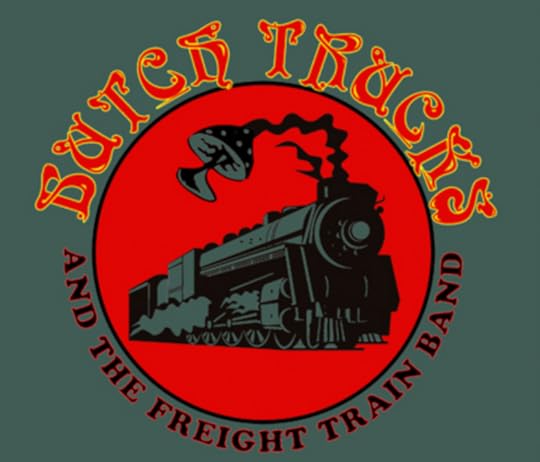
June 24, 2016
Gov’t Mule “Blind Man in the Dark” original demo

Foto-Kirk WEst
Check out Gov’t Mule’s original 1994 demo for “Blind Man In the Dark” from their upcoming CD The Tel-Star Sessions .And remember Allen Woody!
.And remember Allen Woody!
Pre-Order The Tel-Star Sessions here.
June 15, 2016
RIP Henry McCullough, Wings and Grease Band guitarist. An appreciation by Bob Lefsetz
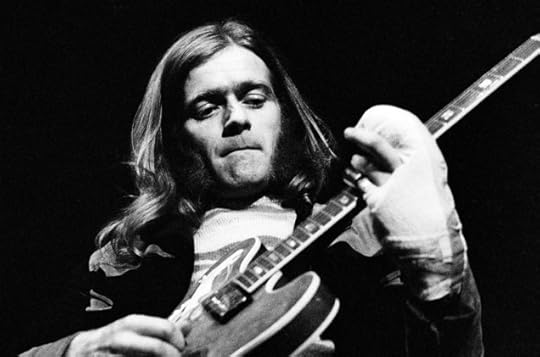
Henry McCullough, 1971 – from Billboard. That’s quite a left hand to play with!
The New York Times ran this nice AP obit, which notes that McCullough improvised his great solo for Paul McCartney’s “My Love” on the spot, in one take. But I wanted to share the following, much more personal take, focusing on the guitarist’s work with Joe Cocker and written by Bob Lefsetz.
Everything below written by Lefsetz – not me!
•
He was in the Grease Band.
What would you do if I sang out of tune?
You’d know one of the most famous songs of all time, the second cut on “Sgt. Pepper.” An iconic number sung by Ringo, one would think it was uncoverable. But this proved to be untrue.
Underground FM radio was slowly becoming the norm. It was a dividing line more accurate than whether or not your hair was long, did you listen? Late at night? When Alison Steele, the Nightbird, took you on tours of aural fantasy? When Rosko and Zacherle escorted you on adventures? When you tuned in to hear not what was already a hit, but that which was brand new, that titillated you, that made you rush out and buy the LP?
Joe Cocker’s take on “With A Little Help From My Friends” was a revelation, a reworking of a classic number into something wholly different. But it never crossed over to the AM dial, most people never heard it, until the “Woodstock” movie blew a hole in the national consciousness, made rock both the soundtrack and the religion of a generation. This was not 2016, when cultural events come and go, that flick played all summer, and one of the highlights was the aforementioned Mr. Cocker, performing “With A Little Help From My Friends.”
It was the same arrangement, but in its live iteration more haunting and powerful, the Chris Stainton organ solo set the tone, but it was Henry McCullough’s soaring, searing guitar which put it over the top.
There’s not a baby boomer alive who doesn’t know that riff.
And now Henry McCullough is dead.
Music is not like movies. Where the public walks out during the credits. Rather, listeners comb the details, read about the studios, the managers and the personnel. I’ve never met Henry McCullough, but I certainly know who he is. Back when musicians were our heroes, before it became about tech and money and steel as opposed to soul. Cash will buy you a comfy bed, but it definitely won’t keep you warm at night, whereas a great tune will not only toast your tootsies, it will set your soul free and give you a reason to live.
McCullough did not play on the studio original, although he was a member of the cast.
And speaking of casts, he was the guitarist on “Jesus Christ Superstar,” back when it was only a recording, when we did not know that Andrew Lloyd Webber was more Broadway than Brill Building, when limits were being tested every damn day and it was a full time job keeping up.
But Henry did play on the second LP, the eponymous “Joe Cocker!,” which is even better than the debut.
And he also graced McCartney’s “Live And Let Die” and “Hi, Hi, Hi,” as well as playing the solo in “My Love.”
He was a soldier in the rock and roll wars. Although we didn’t know that it was a fight, that it was a competition, until decades in we found out some people lived and some people didn’t, some people had careers and some didn’t. Some were famous and some were just working musicians.
Like Henry McCullough.
They just wanted to play. Stardom was a byproduct. Until the Beatles no one expected it to rain down coin, no one expected it to last forever, no one believed half a century later those who were exposed to these tunes would remember every detail, not only the tracks, but who played on them.
We bought our tickets and went to the show, the only place you could experience the magic. There were no cell phones, no selfies, no Snapchat Stories, only memories.
And by time I got to see Joe he was playing with Leon Russell and his band of merrymen known as Mad Dogs & Englishmen.
But just a month before, on the very first night I got stoned, on my 17th birthday, I went with my dearly-departed friend Ronnie to see “Woodstock” in the heart of Boston. This was back when films were platformed, when they didn’t come to your own hometown for months, when you made a pilgrimage, when you recited how many times you saw the flick in the theatre, three in this instance, before everything was available at your fingertips.
And there was no advance word, no news, everything was a discovery. And when Joe Cocker took the stage the excitement was palpable, no one knew about his spastic movements, no one knew what the backup musicians looked like.
And then we did.
I’ll never forget it.
Or Henry McCullough.
–By Bob Lefsetz. Read more here.



